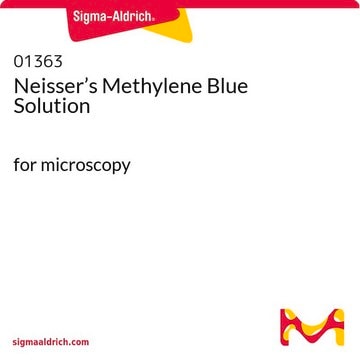M4159
Methylene Blue hydrate
suitable for nucleic acid staining, BioReagent
Synonim(y):
3,7-Bis(dimethylamino)phenothiazin-5-ium chloride xhydrate, Methylene Blue monohydrate, Methylene blue, Nucleic acid staining reagent
About This Item
Polecane produkty
klasa czystości
for molecular biology
Poziom jakości
linia produktu
BioReagent
Postać
powder
metody
nucleic acid detection: suitable
rozpuszczalność
water: 1 mg/mL (dark blue)
przydatność
suitable for nucleic acid staining
temp. przechowywania
room temp
ciąg SMILES
O.[Cl-].CN(C)c1ccc2N=C3C=C\C(C=C3Sc2c1)=[N+](/C)C
InChI
1S/C16H18N3S.ClH.H2O/c1-18(2)11-5-7-13-15(9-11)20-16-10-12(19(3)4)6-8-14(16)17-13;;/h5-10H,1-4H3;1H;1H2/q+1;;/p-1
Klucz InChI
WQVSELLRAGBDLX-UHFFFAOYSA-M
Szukasz podobnych produktów? Odwiedź Przewodnik dotyczący porównywania produktów
Powiązane kategorie
Opis ogólny
Zastosowanie
Cechy i korzyści
- Less hazardous than staining with ethidium bromide
- Viewable in visible light
- Fast and easy to use
produkt powiązany
Hasło ostrzegawcze
Warning
Zwroty wskazujące rodzaj zagrożenia
Klasyfikacja zagrożeń
Acute Tox. 4 Oral
Kod klasy składowania
11 - Combustible Solids
Klasa zagrożenia wodnego (WGK)
WGK 3
Temperatura zapłonu (°F)
Not applicable
Temperatura zapłonu (°C)
Not applicable
Środki ochrony indywidualnej
dust mask type N95 (US), Eyeshields, Gloves
Certyfikaty analizy (CoA)
Poszukaj Certyfikaty analizy (CoA), wpisując numer partii/serii produktów. Numery serii i partii można znaleźć na etykiecie produktu po słowach „seria” lub „partia”.
Masz już ten produkt?
Dokumenty związane z niedawno zakupionymi produktami zostały zamieszczone w Bibliotece dokumentów.
Klienci oglądali również te produkty
Nasz zespół naukowców ma doświadczenie we wszystkich obszarach badań, w tym w naukach przyrodniczych, materiałoznawstwie, syntezie chemicznej, chromatografii, analityce i wielu innych dziedzinach.
Skontaktuj się z zespołem ds. pomocy technicznej







